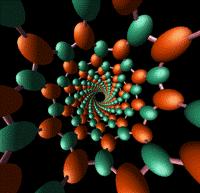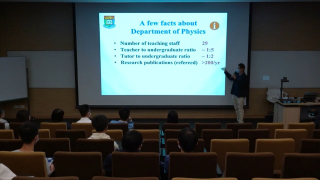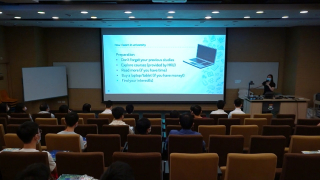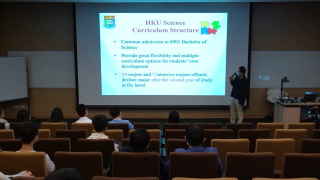For Prospective Students
MAJOR / INTENSIVE MAJOR / MINOR OPTIONS
Students incoming from September 2004 onwards may decide to take the new Major-Minor Option after they are admitted to HKU. Students from most Non-Professional Programmes may choose to follow a Major/Minor in Physics.
Important! Ultimate responsibility rests with students to ensure that the required pre-requisites and co-requisite of selected courses are fulfilled. Students must take and pass all required courses in the selected major or/and minor in order to satisfy the degree graduation requirements.
Research topics of our academic staff
Prof. A.B Djurišić - Optoelectronics and Nanomaterials Laboratory
Prof. D.K. Ki - Lab Introduction
Prof. Z.Y. Meng - Computational Condensed Matter Physics group
Prof. C.J. Wang - Topological Phases and Emergent Phenomena
WHY PHYSICS?

A computer simulation of a v, Chopra et al., Science 269, 966 (1996)
Physics is one of the most fundamental sciences, which provides the basis of our understanding of the Universe and enables us to understand how things work which is the base for technology development.
In a modern society, technology and science have an impact on a broad section of the workforce. Many workers use high technology tools without understanding them, and high technology products are also becoming a part of everyday life. In order to enable efficient use of novel technologies and prevent accidents, it is important to have some understanding how they work. And this is where physics training can help. Studies have shown that physics training is of considerable value for many different professions. This is because physics education fosters development of general skills which are useful in great variety of career choices.
Apart from physics knowledge, the abilities which you will gain from physics education are:
|
|
Additional benefits of studying physics are: small class sizes, no need to memorize large amounts of facts, availability of academic staff to answer questions (we like it when our students ask questions), and low unemployment rate of physics graduates.
MAJOR
Choosing a Major in Physics
Major in Physics is mainly suitable for students looking for a career in physics, technology, or science education. If you want to obtain a major in physics, you should have a strong mathematics background or be prepared to work hard in your first year of study in order to compensate for deficiencies in mathematical knowledge.
MINOR
Choosing a Major in Physics
Minor in Physics is very useful for students majoring in other sciences and engineering. Considering the increasing importance of multidisciplinary research in science and engineering, a minor in physics can greatly enhance understanding of the chosen major, and enable better options for postgraduate study and employment.
Physics is also useful for business students, since it provides a basis for evaluations of novel technologies which is essential for making good decisions on development plans and directions. Students from some other fields, such as humanities and journalism, can also benefit from a minor in physics. The courses required for completing a minor in physics have been chosen in such a way to improve your understanding of the world around you and encourage development of useful skills (see above) which are applicable to many different fields.
WHY PHYSICS IN HKU?
1
The University of Hong Kong (HKU) is the oldest and well established university in Hong Kong.
2
HKU allow students to major or minor in Physics. Option of Minor in Astronomy is also available.
3
The available options are very flexible in order to provide the opportunity to students to make the best possible choices for their chosen career paths.
4
The class size is small, the teacher-student ratio is high, and the atmosphere is friendly.
5
We have large variety of courses for students to choose from.
6
HKU graduates have a wide range of career opportunities and have a great record of finding employment.
7
Our teaching staff are committed to teaching students analytical and problem solving skills which are essential for any career.
8
There are opportunities for research for undergraduate students (two courses, PHYS3999 and PHYS4999), as well as postgraduate studies in Physics.
9
Physics Department at HKU has facilities for research in different areas of physics (see pages of research groups here).
10
Research efforts are internationally recognized. Number of publications in refereed journals per year is in the range 140-160, average impact factor was 4.4 in 2013, and the average annual number of citations is about 2000.
ADMISSION VIDEOS








